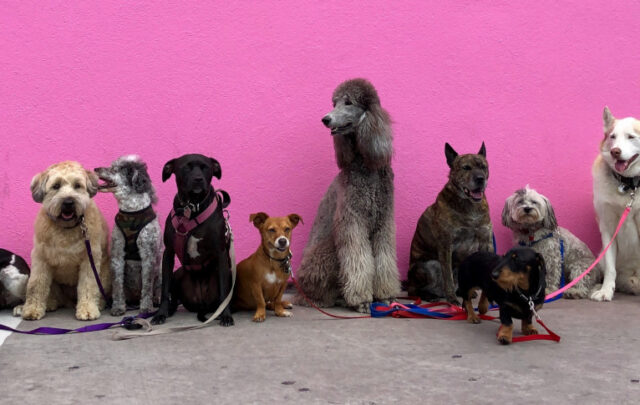
I was at the WTO protests in Seattle in 1999. Other than blocking the entrance to the WTO summit, and a few pre-organized march routes at certain days and times, there wasn’t much in the way of plans. So people collected into ‘affinity groups’ to make their own group decisions about what to do and where to go: Shall we lock arms in front of this door to the convention center and risk some pushing, or just stick to standing and yelling? Shall we sit down in front of this police advance and resign ourselves to being arrested?
It was an incredibly inspiring experience. And at times amusing, too. I’ll never forget the looks of confusion on the cops’ faces as a march of about 500 of us suddenly sat down in front of their line… and embarked on an multi-hour call-and-response consensus decision-making session about whether to continue marching to the downtown prison or go somewhere else.
—"The police have told us…"
— "THE POLICE HAVE TOLD US!"
— "That we are not allowed… "
— "THAT WE ARE NOT ALLOWED!"
— "To proceed on this…"
— "TO PROCEED ON THIS!"
— "Street."
— "STREET!"
— "So…"
— "SO!"
— "We need to…"
— "WE NEED TO…" etc.
It was also a radicalizing experience. At least 1,000 of us eventually gathered in front of the downtown Seattle prison to demand the release of those who’d been arrested. And that thousand-some of us (and eventually many more) started hearing about some pretty terrible things. Protestors in custody being held on police buses and kept there for hours without access to a bathroom. Vegetarian protestors in custody being given nothing to eat for over half a day, or longer, except a baloney sandwich. There was even a story that some protestors, perhaps the more unruly ones, had been stripped and cuffed to floors of their cells. (And I doubt it was lost on anyone that, if this was the way us largely middle-class, educated white folks were being treated, it was surely significantly worse for the countless underprivileged young black men who are thrown into the U.S. prison system daily.)
 And of course, there was the policy brutality many of us witnessed first-hand on the street. It still boils my blood when I hear the protests referred to as a "riot." A handful of black-masked kids trashing a few corporate storefronts is not a riot. A squad of heavily armored police rushing a group of sitting, peaceful demonstrators, pepper-spraying them point-blank and hauling them off to vans with bruises and broken bones… that’s closer to the definition of a riot in my opinion.
And of course, there was the policy brutality many of us witnessed first-hand on the street. It still boils my blood when I hear the protests referred to as a "riot." A handful of black-masked kids trashing a few corporate storefronts is not a riot. A squad of heavily armored police rushing a group of sitting, peaceful demonstrators, pepper-spraying them point-blank and hauling them off to vans with bruises and broken bones… that’s closer to the definition of a riot in my opinion.
So what does this have to do with #Occupy? Whatever the #Occupy protests end up accomplishing (and it seems like they’ve already accomplished bringing a badly-needed spotlight on the worsening plight of the "99%"), they are—right now—giving a whole new generation of young people invaluable experience, just as WTO gave to my "generation."
There are now tens of thousands of so-called Millennials who—for likely the first time ever—are having the life-changing experience of standing up and demanding change, of marching in the streets, of getting beat on and pepper-sprayed by the police, of getting misportrayed and vilified by the media,… and of coming back and keeping at it, and seeing their actions pay off.
And there are maybe millions of Millennials who are not on the streets but are watching on TV people just like them having these experiences — and don’t doubt for a second that they’re being affected too.
 I remember during the organizing and the build-up to the WTO protests that it felt like something big was finally changing. The general political complacency of the 1990s was finally —finally!— giving way to some real agitation. When the demonstrations finally happened, they caught the WTO, the media, and certainly the Seattle police off-guard…. and the agitation continued, through to the election and inauguration of George W. Bush, the launch of the Afghanistan War, and (with the biggest mass protests in human history, you’ll remember) the build-up to the Iraq War. But five years of seemingly fruitless protests, topped off by Bush’s defeat of Kerry by an indisputable margin, took the wind out of most of our sails for the rest of the decade.
I remember during the organizing and the build-up to the WTO protests that it felt like something big was finally changing. The general political complacency of the 1990s was finally —finally!— giving way to some real agitation. When the demonstrations finally happened, they caught the WTO, the media, and certainly the Seattle police off-guard…. and the agitation continued, through to the election and inauguration of George W. Bush, the launch of the Afghanistan War, and (with the biggest mass protests in human history, you’ll remember) the build-up to the Iraq War. But five years of seemingly fruitless protests, topped off by Bush’s defeat of Kerry by an indisputable margin, took the wind out of most of our sails for the rest of the decade.
Meanwhile, the Millennials grew up, and #Occupy is proving to be their first big political roar. Watch out.
PHOTOS: BBC; unknown; Occupy DC (by-nc-sa) thisisbossi
Like this post?
Keep the information flowing: Donate to Post Carbon Institute
Stay connected: Receive our monthly e-newsletter
Reposting: See our reposting policy
Get The End of Growth http://www.postcarbon.org/eog | Watch the animation Who Killed Economic Growth? http://bit.ly/whokilledgrowth





